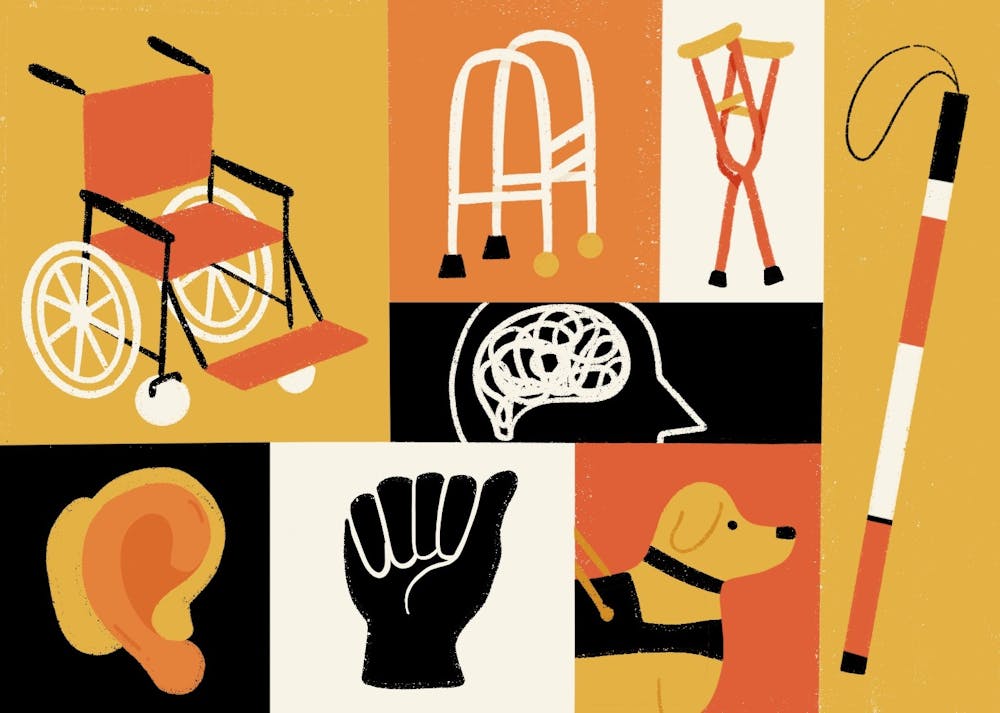The Accessibility Coalition announced last week it will be the eighth and newest member of ASU’s Council of Coalitions, representing and advocating for students with disabilities at the University.
The Council of Coalitions unanimously voted in the Accessibility Coalition after the group garnered the support of 70 groups and students on campus and put together a presentation showcasing the need for disability advocacy and awareness on campus.
The Accessibility Coalition hopes to use the resources and collaboration the Council of Coalition provides to emphasize intersectionality with the other groups and to make ASU campuses more accessible for all students. Official recognition within the Council of Coalitions means additional University funding, potential for spaces on campus and increased visibility, said Jaclyn Fishbach, a freshman studying marketing and psychology who is a co-executive of the Accessibility Coalition.
“The Accessibility Coalition's mission is to help educate the community on disability awareness and ableism as well as provide a space for students with disabilities to be able to talk with one another and just get support from within the community,” Fishbach said.
So far, the Accessibility Coalition represents Active Minds, Advocating Sun Devils, American Sign Language Club, Disability and Chronic Illness Support, Disabled Law Students Association, Integrated Accessible Mentoring and Sparky’s Service Dogs.
Although ASU has some disability resources, such as Student Accessibility and Inclusive Learning Services, many students are still experiencing issues with accommodations and gaps in their knowledge of available resources, said Natalie Snodgrass, a junior studying psychology and one of the co-executives of the Accessibility Coalition.
READ MORE: Some students with disabilities no longer receiving early class registration
Talking through their experiences with other students with disabilities can help those who are struggling learn how to utilize the resources SAILS provides and know what accommodations might be available. The coalition also offers peer-to-peer support, which may make some students more comfortable than talking to professionals with SAILS, Snodgrass said.
“Being able to come to us and being able to feel comfortable, knowing that there's a place for them to go to be with other disabled students, or to even just stop in and ask a question to somebody, if it's online or in person or whatever, I think that’s huge,” Snodgrass said.
The Accessibility Coalition, formed out of a Humanities Lab course called "Disrupting Dis/Ability," has been working on joining the Council over the course of the spring semester.
READ MORE: ASU students join together to create an Accessibility Coalition
The Council of Coalitions as a whole represents and advocates for a variety of marginalized communities at ASU, said Mastaani Qureshi, a junior studying history and justice studies and co-president of the Women’s Coalition.
“Together all the councils, all the coalitions come together to form solidarity and to see how we can help each other in some of our collective struggles and to really pinpoint intersectionality within our communities,” Qureshi said.
Intersectionality, how different factors of identity such as race, religion, gender and disability are interconnected, is especially prevalent with the Accessibility Coalition because the disability community is so diverse.
Thinking about the connections between each coalition can allow students to get out of their comfort zones and learn about things they may not have known before, said Carlos Aguilar-Negrete, a junior studying electrical engineering and vice president of the Coalition of International Students.
“Being a part of the Council of Coalitions ... just opens up a lane for the disability community to attach themselves with all these other communities and open the eyes,” said Garrett Tanner, a junior studying marketing and a member of the Accessibility Coalition. It “let(s) them know that there's disability within their communities, but that we have a place for everybody.”
Currently, the group is moving forward with several initiatives, including one to put trash cans in men's restroom stalls for students who may need them and a mentoring program where students with disabilities can be paired with other students with disabilities to talk through their experiences at ASU, Fishbach and Snodgrass said.
“One thing that we are advocating for is to have a lower sensory welcome event in the fall because a lot of members that are part of our community need to have a lower sensory option,” Fishbach said.
The group has been focusing on crowdsourcing ideas for initiatives from their members to think of new ways to advocate for accessibility on campus.
“I just hope for them to kind of keep up that momentum of really spreading that awareness and really making their voices heard," Aguilar-Negrete said. "And they're making a lot of movement."
Reach the reporter at alcamp12@asu.edu and follow @Anna_Lee_Camp on Twitter.
Like The State Press on Facebook and follow @statepress on Twitter.
Continue supporting student journalism and donate to The State Press today.




